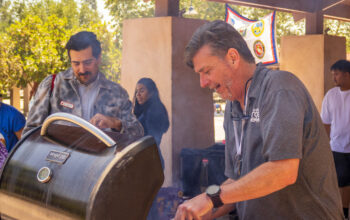Brothers Misaq and Matin Eshaghi delivered a riveting performance Nov. 14 during Pierce College’s free weekly Thursday concert series, playing four different settings with the traditional Persian tar, tonbak, kamancheh, and daf.
Both Misaq and Matin are well established in the Persian performance arts, playing internationally and producing three CDs with their mother and father, Fariba and Darius Eshaghi. The family intends to release a new recording soon.
The brothers started with a composition played on a tar — a type of lute with a sound that resembles that of a violin and a guitar combined — and a tonbak, a complex single-handed percussion instrument that requires the player to tap different parts of the drum for the desired pitch.
Misaq and Matin play the tonbak and tar, respectively.
“It’s mostly improvised,” Misaq said before the first piece. “The tonbak is one of the most complicated of percussion instruments.”
*Opening the piece with a solo on the tar, Matin played at his own pace, often switching tempo and pausing briefly in-between each measures before slowly starting another that would rise and fall in different dramatic tones.
*Misaq entered in the composition halfway with the tonbak, garnishing Matin’s spontaneous tar melodies with his own lightning strikes notes that would require a metronome to click faster than 368 beats per minute.
The brothers also performed on two instruments called the kamancheh and daf. The kamancheh is a stringed instrument played with a bow while standing erect on the floor like a cello, and is one of the key instruments that personifies Persian music.
The daf is a large frame-drum, a tambourine-like instrument that compliments the musical setting with tremendous sound and vibrating rings that add effect to the melody.
Using these instruments in different combinations, the Eshaghi brothers delivered the authentic sound of Persian culture, with melodies varying from somber to heartening.
The audience, who mostly consist of music appreciation students required to attend, stood up at attention during the whole performance rather than slouching in the seats toward the end or even leaving early.
The duo even displayed their poetic skills, singing Persian hymns in their native tongue during one of the compositions.
The next guest performance for the free Thursday concerts is harp player Jacqueline Marshall, performing compositions from Astor Piazzolla, Alan Hovhaness, Victor Young, and Christopher Caliendo on Nov. 21.



